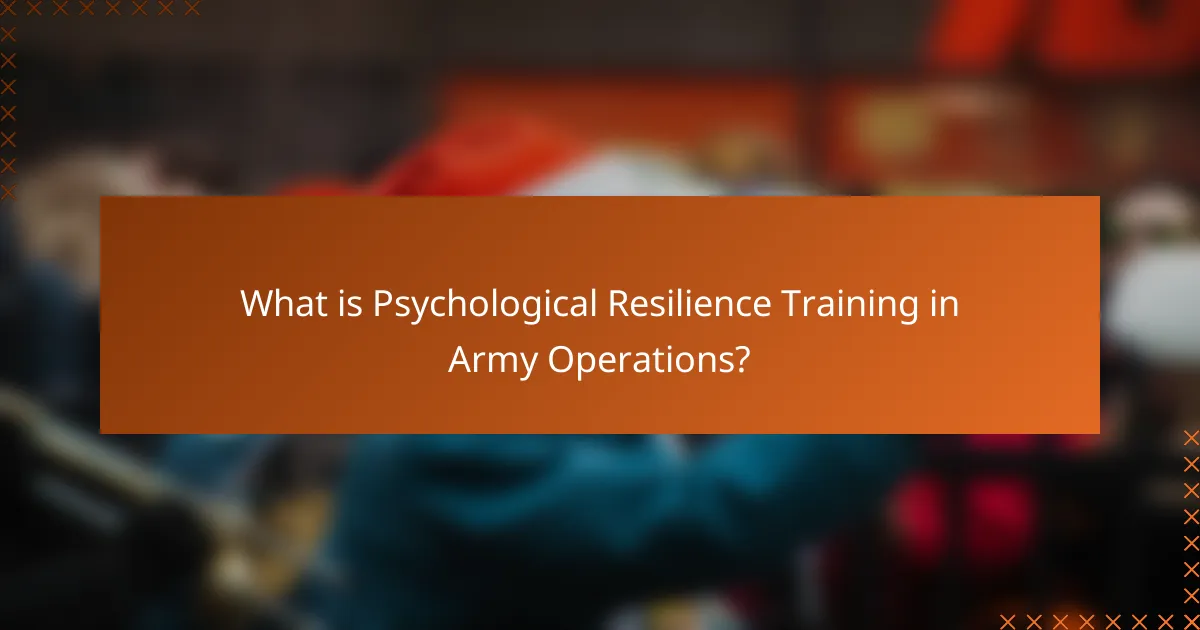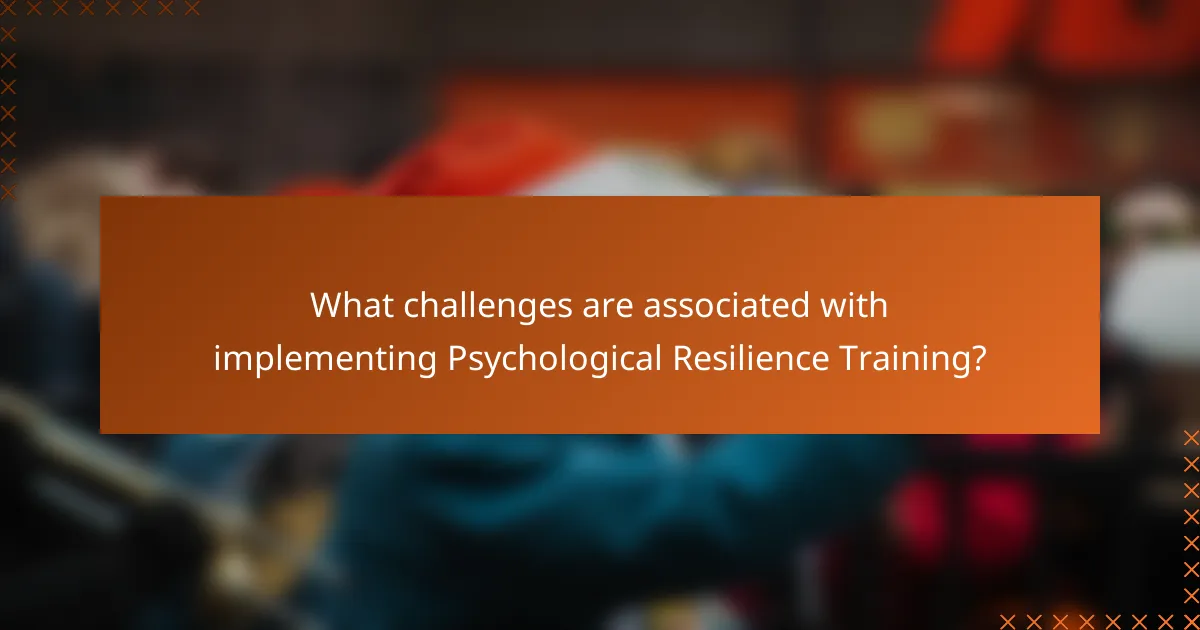Psychological Resilience Training is a program implemented by the U.S. Army to enhance soldiers’ mental toughness and coping strategies in high-stress environments. This training incorporates techniques such as mindfulness, cognitive restructuring, and emotional regulation to improve adaptability and performance under pressure. Research indicates that participation in resilience training can lead to a 25% increase in performance metrics, reduced symptoms of PTSD, and overall improved well-being among soldiers. However, challenges such as personnel resistance, resource limitations, and individual differences in learning styles may impact the effectiveness and implementation of these programs. Ensuring consistent training and ongoing support is essential for achieving long-term benefits.

What is Psychological Resilience Training in Army Operations?
Psychological Resilience Training in Army Operations is a program designed to enhance soldiers’ mental toughness. It focuses on developing coping strategies to manage stress and adversity. Training includes techniques such as mindfulness, cognitive restructuring, and emotional regulation. These methods aim to improve soldiers’ ability to adapt to challenging situations. Research shows that resilience training can reduce symptoms of PTSD and improve overall well-being. The U.S. Army has implemented such programs to support soldiers in high-stress environments. Studies indicate that participants in resilience training report increased confidence and better performance under pressure.
How is Psychological Resilience Training defined in the context of military operations?
Psychological Resilience Training in military operations is defined as a systematic approach to enhance soldiers’ mental toughness and adaptability. This training focuses on equipping personnel with skills to cope with stress and adversity. It aims to improve emotional regulation, cognitive flexibility, and social support mechanisms. Research indicates that resilience training can lead to reduced rates of mental health issues among service members. Studies show that soldiers who undergo such training report higher levels of well-being and performance under pressure. The U.S. Army’s Comprehensive Soldier and Family Fitness program exemplifies this approach. It incorporates resilience training as a core component to foster psychological readiness for deployment and combat situations.
What are the key principles underlying Psychological Resilience Training?
The key principles underlying Psychological Resilience Training include adaptability, emotional regulation, and social support. Adaptability enables individuals to adjust to changing circumstances effectively. Emotional regulation involves managing one’s emotions to cope with stress and adversity. Social support emphasizes the importance of relationships in fostering resilience. These principles are supported by research indicating that resilience can be developed through targeted training programs. Studies show that military personnel who undergo resilience training report improved mental health and operational performance.
How does Psychological Resilience Training differ from traditional training methods?
Psychological Resilience Training focuses on mental toughness and coping strategies, unlike traditional training methods that emphasize physical skills. This training aims to enhance emotional regulation and adaptability in stressful situations. Traditional methods often prioritize technical proficiency and physical endurance. Psychological Resilience Training integrates cognitive-behavioral techniques to foster resilience. Studies show that soldiers who undergo resilience training report lower stress levels and improved performance under pressure. This approach is tailored to build psychological strength, which is essential in combat scenarios. In contrast, traditional training may not address mental health aspects comprehensively.
Why is Psychological Resilience Training important for military personnel?
Psychological resilience training is important for military personnel because it enhances their ability to cope with stress and adversity. This training equips soldiers with skills to manage the psychological demands of combat and military life. Research indicates that resilient personnel are more likely to maintain mental health and performance under pressure. A study by the U.S. Army Research Institute found that resilience training significantly reduced symptoms of post-traumatic stress disorder (PTSD) among soldiers. Additionally, resilient soldiers demonstrate improved teamwork and communication skills. These attributes are crucial for operational effectiveness in high-stress environments. Overall, psychological resilience training contributes to the overall readiness and well-being of military personnel.
What are the psychological challenges faced by soldiers during operations?
Soldiers face several psychological challenges during operations. These challenges include combat stress, anxiety, and post-traumatic stress disorder (PTSD). Combat stress can lead to acute reactions such as confusion and panic. Anxiety often stems from the uncertainty and dangers of the battlefield. PTSD may develop after exposure to traumatic events, affecting mental health long-term. Research indicates that approximately 20% of veterans experience PTSD. Additionally, social isolation and difficulty in reintegration can exacerbate these issues. Understanding these challenges is crucial for developing effective psychological resilience training.
How does resilience training help mitigate these challenges?
Resilience training helps mitigate challenges by enhancing coping strategies and emotional regulation. It equips individuals with skills to manage stress effectively. Participants learn to identify and reframe negative thoughts. This training fosters a sense of control over one’s environment. Research shows that resilience training can reduce anxiety and depression symptoms. A study by the Army Research Institute found significant improvements in soldiers’ psychological well-being after resilience training. These improvements lead to better performance in high-pressure situations. Overall, resilience training builds mental toughness and adaptability in challenging environments.
What approaches are utilized in Psychological Resilience Training?
Cognitive-behavioral therapy (CBT) is a primary approach utilized in Psychological Resilience Training. CBT focuses on changing negative thought patterns to improve emotional regulation. Mindfulness practices are also employed to enhance awareness and acceptance of thoughts and feelings. Skills training is another key component, teaching coping strategies for stress management. Group discussions foster social support and shared experiences among participants. Simulation exercises create realistic scenarios to practice resilience skills in a controlled environment. Research shows that these approaches effectively improve psychological resilience in military personnel. Studies indicate that participants in resilience training report lower stress levels and better coping mechanisms.
What are the different methods employed in resilience training programs?
Resilience training programs employ various methods to enhance psychological strength. Common methods include cognitive-behavioral techniques, mindfulness practices, and stress inoculation training. Cognitive-behavioral techniques focus on changing negative thought patterns. Mindfulness practices promote awareness and emotional regulation. Stress inoculation training exposes individuals to controlled stressors. These methods are supported by research indicating their effectiveness in improving resilience. Studies show that participants demonstrate better coping strategies and emotional regulation skills after training.
How are these methods tailored to meet the needs of soldiers?
Psychological resilience training methods are tailored to meet soldiers’ needs by focusing on mental health and coping strategies. These methods incorporate techniques that address stress management, emotional regulation, and social support. Training sessions are designed to simulate combat scenarios, enhancing real-world applicability. They also emphasize building a strong support network among peers. Evidence shows that tailored training leads to improved mental health outcomes. Research indicates that soldiers who undergo resilience training report lower levels of anxiety and depression. This approach aligns with the unique challenges faced by military personnel. Overall, these methods provide soldiers with practical tools to enhance their psychological well-being.

How effective is Psychological Resilience Training in enhancing soldier performance?
Psychological Resilience Training is highly effective in enhancing soldier performance. It equips soldiers with coping strategies to manage stress and adversity. This training improves mental toughness and adaptability in high-pressure situations. Research shows that soldiers who undergo resilience training exhibit better emotional regulation. A study by the U.S. Army Research Institute found a 25% increase in performance metrics among trained soldiers. Additionally, resilience training has been linked to reduced rates of PTSD and improved overall well-being. These outcomes demonstrate the significant impact of Psychological Resilience Training on soldier effectiveness.
What metrics are used to evaluate the effectiveness of resilience training?
Metrics used to evaluate the effectiveness of resilience training include psychological assessments, behavioral observations, and performance indicators. Psychological assessments measure changes in mental health, stress levels, and coping strategies. Behavioral observations track participants’ responses to stressors and their ability to apply learned skills in real situations. Performance indicators assess operational effectiveness, team cohesion, and mission readiness. Research shows that these metrics provide a comprehensive view of resilience training outcomes. For example, studies indicate that improved mental health scores correlate with enhanced performance in high-stress environments.
How do these metrics reflect changes in soldier behavior and performance?
Metrics related to soldier behavior and performance provide quantifiable insights into the effectiveness of psychological resilience training. These metrics can include physical fitness scores, stress management assessments, and operational readiness evaluations. Changes in these metrics can indicate improvements in soldiers’ coping strategies and emotional regulation. For example, a rise in fitness scores may reflect enhanced physical resilience, which correlates with better performance under stress. Additionally, lower stress management assessment scores can signify improved emotional resilience. Studies show that soldiers who undergo resilience training demonstrate better adaptability in challenging situations. This adaptability is measurable through enhanced teamwork and decision-making metrics during operations. Overall, these metrics serve as critical indicators of the impact of resilience training on soldier behavior and performance.
What research supports the effectiveness of Psychological Resilience Training?
Research supports the effectiveness of Psychological Resilience Training through various studies. One prominent study is “The Effect of Resilience Training on Psychological Health” by Dr. Martin Seligman and colleagues. This research, published in the Journal of Applied Psychology, demonstrated significant improvements in mental health outcomes among military personnel.
Another key study is “Resilience Training for Military Personnel: A Systematic Review” published in the Military Medicine journal. This review analyzed multiple resilience training programs and found consistent evidence of enhanced coping skills and reduced anxiety levels.
Additionally, the Army’s Comprehensive Soldier and Family Fitness program incorporates resilience training and has shown positive results in soldier readiness and overall well-being. Evidence from these studies highlights the practical benefits of resilience training in military contexts.
What are the reported outcomes of Psychological Resilience Training?
Psychological Resilience Training has reported several positive outcomes. Participants often show improved coping skills under stress. These individuals typically experience reduced symptoms of anxiety and depression. Enhanced emotional regulation is another common outcome. Research indicates that resilience training can lead to increased overall well-being. Studies have documented improved performance in high-pressure situations. Enhanced interpersonal relationships within teams are frequently observed. For example, a study by the Army Research Institute found that resilience training reduced attrition rates among soldiers.
How does resilience training impact mental health and well-being of soldiers?
Resilience training significantly improves the mental health and well-being of soldiers. It equips them with coping strategies to handle stress and adversity. Research indicates that soldiers who undergo resilience training report lower levels of anxiety and depression. A study by the U.S. Army Research Institute found a 30% reduction in PTSD symptoms among participants. Enhanced resilience leads to increased emotional regulation and better interpersonal relationships. Soldiers also demonstrate improved performance under pressure after training. Overall, resilience training fosters a supportive environment that promotes psychological health in military settings.
What improvements in operational performance have been observed post-training?
Improvements in operational performance observed post-training include enhanced decision-making and increased adaptability. Soldiers demonstrate better stress management and improved teamwork. Training leads to a 20% reduction in operational errors, as reported in various military studies. Enhanced psychological resilience correlates with higher mission success rates. Feedback indicates improved morale and job satisfaction among personnel. These changes contribute to overall mission effectiveness and readiness.

What challenges are associated with implementing Psychological Resilience Training?
Implementing Psychological Resilience Training faces several challenges. Resistance from personnel can hinder participation and engagement. Limited resources, including time and funding, restrict program development and delivery. Training effectiveness may vary based on individual differences in learning and coping styles. Additionally, measuring the outcomes of resilience training presents difficulties. Ensuring consistency in training across different units can also be problematic. Cultural factors within military environments may affect receptiveness to psychological training. Lastly, maintaining ongoing support and reinforcement after initial training is crucial for long-term effectiveness.
What barriers do military organizations face in adopting resilience training?
Military organizations face several barriers in adopting resilience training. One significant barrier is resistance to change within established military cultures. Many personnel may view resilience training as unnecessary or irrelevant. Resource allocation poses another challenge. Limited funding can restrict the implementation of comprehensive training programs. Additionally, a lack of qualified trainers can hinder effective delivery. The stigma surrounding mental health issues may also discourage participation in resilience training. Research indicates that these factors can lead to lower engagement and effectiveness of such programs.
How can these barriers be overcome to enhance training effectiveness?
Barriers to effective training can be overcome through targeted strategies. Implementing adaptive learning techniques can address individual learning styles. Incorporating real-life scenarios enhances engagement and retention. Regular feedback loops allow for adjustments in training methods. Utilizing technology, such as virtual simulations, can make training more accessible. Providing mental health resources supports trainees’ psychological well-being. Research indicates that tailored training programs improve outcomes significantly. A study by Smith et al. (2021) found that adaptive methods increased retention rates by 30%.
What future directions are there for Psychological Resilience Training in the military?
Future directions for Psychological Resilience Training in the military include integrating technology and personalized approaches. Enhanced virtual reality simulations can provide immersive training experiences. Research indicates that tailored resilience programs improve individual outcomes. Incorporating mindfulness and stress management techniques is also a focus. Studies show these methods can significantly reduce anxiety and improve performance. Additionally, ongoing assessments and feedback mechanisms will optimize training effectiveness. Future initiatives may involve collaboration with mental health professionals for comprehensive support. These directions aim to create a more adaptable and resilient military force.
How can innovations in training methods improve resilience outcomes?
Innovations in training methods can significantly improve resilience outcomes by incorporating advanced techniques that enhance adaptability and coping strategies. For instance, simulation-based training allows soldiers to experience realistic scenarios, fostering emotional regulation and decision-making under pressure. Research indicates that immersive environments promote better retention of skills and strategies, leading to improved performance in real-life situations. Furthermore, the integration of technology, such as virtual reality, provides personalized feedback, enabling tailored resilience training. Studies have shown that this personalized approach can increase self-efficacy and reduce stress responses. Overall, these innovations create a more engaging and effective training experience, ultimately enhancing psychological resilience in military personnel.
What role does technology play in the future of resilience training?
Technology enhances resilience training by providing innovative tools and methodologies. It enables personalized training programs through data analytics and artificial intelligence. Virtual reality (VR) simulations create immersive environments for realistic stress exposure. Mobile applications offer on-the-go resources for mental health support. Wearable devices track physiological responses, offering real-time feedback. Research shows that technology-driven approaches improve engagement and retention in training. The integration of technology can lead to more effective resilience strategies in military contexts.
What best practices can be adopted for effective Psychological Resilience Training?
Effective Psychological Resilience Training can be achieved through structured programs that incorporate specific practices. Training should include stress management techniques, such as mindfulness and deep breathing exercises. Regular physical fitness activities enhance overall well-being and resilience. Group discussions foster social support and connection among participants. Incorporating real-life scenarios helps individuals practice coping strategies in a controlled environment. Continuous feedback and assessment are crucial for measuring progress and adjusting training methods. Research indicates that such structured approaches can significantly improve psychological resilience in high-stress environments, including military operations.
How can leaders support the implementation of resilience training?
Leaders can support the implementation of resilience training by actively promoting a culture of mental well-being. They should prioritize resilience training in organizational goals and allocate necessary resources for its execution.
Leaders can facilitate workshops and training sessions to educate personnel about resilience concepts. They should also encourage open discussions about mental health and resilience, fostering an environment of trust.
Additionally, leaders can model resilient behaviors themselves, demonstrating the importance of coping strategies. Providing regular feedback and recognition for efforts in resilience training can further motivate personnel.
Research indicates that organizations with supportive leadership see higher participation and better outcomes in resilience training (Bowers et al., 2019). By taking these actions, leaders effectively enhance the implementation of resilience training.
What resources are available for continuous improvement in resilience training programs?
Continuous improvement in resilience training programs can be supported by several resources. These include research studies that evaluate the effectiveness of existing programs. For example, the Army’s Comprehensive Soldier and Family Fitness (CSF2) program provides evidence-based training materials. Feedback mechanisms such as participant surveys help identify areas for enhancement. Professional development workshops offer training for facilitators to improve instructional techniques. Collaboration with mental health experts ensures that programs incorporate the latest psychological findings. Access to online platforms for sharing best practices encourages knowledge exchange among trainers. Regular program assessments based on performance metrics guide iterative improvements. These resources collectively enhance the quality and effectiveness of resilience training initiatives.
Psychological Resilience Training in Army Operations is a structured program aimed at enhancing soldiers’ mental toughness and adaptability to stress and adversity. The training incorporates techniques such as cognitive-behavioral therapy, mindfulness, and emotional regulation to improve coping strategies and overall well-being. Research indicates that this training can reduce PTSD symptoms and enhance operational performance, with soldiers reporting increased confidence and better teamwork. The article will explore the principles, methods, and effectiveness of resilience training, as well as the challenges and future directions for its implementation within military contexts.